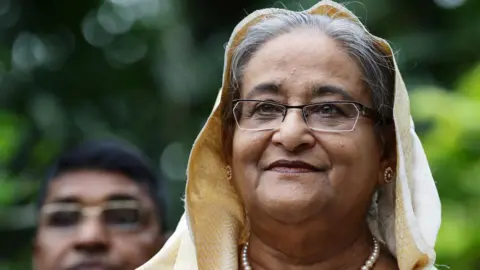From Pro-Democracy Champion to Autocratic Leader: The Downfall of Sheikh Hasina
Once hailed as a beacon of hope for democracy in Bangladesh, Sheikh Hasina's political career has taken a sharply downward turn. After 15 years of rule, she fled from mass protests in August 2024 and is now facing severe ramifications for her authoritarian governance.
In a striking development, Hasina was sentenced to death by a tribunal in Dhaka on November 17, 2025, for crimes against humanity. This verdict follows a series of protests which erupted against her increasingly repressive regime that reportedly led to the deaths of over 1,400 individuals due to police brutality.
Critics argue that Hasina, who had previously been celebrated for overseeing significant economic advancements, succumbed to autocratic tendencies, employing violent measures against opposition. Her leadership, marked by the country’s economic growth, is now overshadowed by widespread allegations of politically motivated arrests and extrajudicial killings.

A Defiant Rule and a Violent Ouster
In January 2024, Hasina won a fourth term in controversial elections described as rigged. Following this, civil unrest grew, initially manifesting as protests against civil service quota reforms, but eventually escalating into wider calls for her resignation.
Despite the growing opposition, Hasina remained steadfast, labeling protestors as 'terrorists' and responding with severe crackdowns. Reports surfaced of her directive to security forces to utilize lethal means against demonstrators. The bloodshed of August 5, 2024, symbolizes the peak of violence, leading to mass protests and her subsequent flight from the country.
The Rise of Sheikh Hasina
Born into a politically prominent family, Hasina rose to power in 1996. Her early rule saw significant policy achievements like water-sharing agreements with neighboring India and efforts to establish peace in the tribal regions. Yet allegations of corruption and partiality to India plagued her earlier administrations.
After a temporary setback, Hasina returned to power in 2009, leading to considerable economic growth in Bangladesh. The garment industry flourished under her leadership, spurring significant reductions in poverty levels.
Controversies and Human Rights Abuses
However, this economic progress has not been without its controversies. Since her return to power, numerous reports of human rights violations have surfaced. An estimated 700 cases of enforced disappearances and several documented instances of extrajudicial killings exist under her regime. Notably, the U.S. sanctioned the Rapid Action Battalion, a police unit accused of orchestrating these human rights abuses.
As Bangladesh grapples with the aftermath of Hasina's rule, the future remains uncertain. The country’s escalating inflation and financial troubles have drawn criticism regarding governance. While many celebrate the fall of what many perceive as a tyrant, the road ahead for Bangladesh under new leadership poses its own challenges.


















